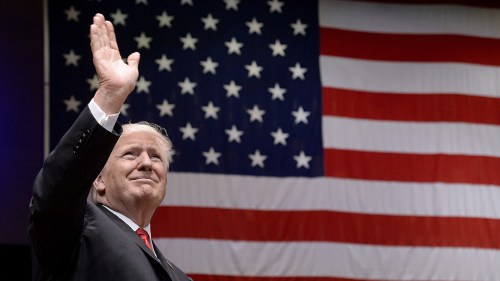House Republican fights for his political life in Arizona swing district

Rep. Dave Schweikert (R-Ariz.) is fighting for his political life in a key Arizona swing district, in what observers say will likely be the most competitive race of his years-long career.
Schweikert, who has represented parts of Phoenix and Scottsdale for over a decade, is running against Democrat Amish Shah as he looks to secure his eighth term representing a district that has come to be seen as an important bellwether due to the area’s high percentage of college-educated suburban voters.
After narrowly winning reelection in 2022, Schweikert is looking to harness energy from having former President Trump at the top of the ticket this go-round. But some political observers point to an abortion ballot measure, controversy surrounding Republican Senate candidate Kari Lake and the general changing dynamics of the district as factors that could work against the incumbent.
“It’s a district that has been Republican, but always we’ve looked at it as a district that’s moving into that Democratic category, highly competitive,” said Chuck Coughlin, an Arizona-based political strategist, noting that Shah could benefit from high youth turnout thanks to the presidential race.
Schweikert moved from Arizona’s 6th Congressional District to Arizona’s 1st Congressional District in 2022. The highly educated, affluent district includes Cave Creek, Scottsdale and Fountain Hills. But pockets of it are blue-leaning and they could provide an opening for Shah to make his mark.
“His district has changed a bit, and this is a presidential cycle, which are two things that might work against him, but what does work for him is he has a very good reputation, and he is a long-time incumbent, and he’s a Republican and a district that is still nominally Republican and Trump is on the ballot,” said Stan Barnes, a former Republican state senator who’s now a political consultant in Arizona.
Public polling of the race, which The Cook Political Report rates as a “toss up,” has been sparse.
The Democratic Congressional Campaign Committee in mid-August released a poll that found the candidates were tied at 48 percent, while 4 percent were undecided. The House Majority PAC, which is aligned with House Minority Leader Hakeem Jeffries (D-N.Y.), released a poll in mid-September that had Shah up by 1 point, 48 percent to 47 percent. The Hill/Decision Desk HQ’s latest forecast gives Schweikert a 70 percent chance of winning.
Strategists said that Shah, who said he has knocked on over 22,000 doors, needs to expand his name identification in the district and cautioned the physician has never run “a highly competitive big race like this.”
“Dr. Shah has a very good reputation for knocking on doors and being very friendly, and has a good reputation with the electorate out there, but he’s not really well known, and so he’s gotta work hard, raise a lot of money, gotta do a media campaign to introduce himself,” Coughlin said.
Both the National Republican Congressional Committee (NRCC) and the Congressional Leadership Fund, the GOP super PAC dedicated to winning the House, have looked to tie Shah to Vermont Sen. Bernie Sanders (I) over the physician’s previous support of Medicare for All. They’ve also portrayed him as being soft on border security and being for raising taxes, the top issues in the district.
During Shah’s appearance at a forum hosted last week by the Citizens Clean Elections Commission, he said he would “secure the border” but did not specify if he fully supports Proposition 314, a measure that will be on the ballot in November that would criminalize unauthorized border crossings by migrants and allow state and local authorities to arrest them. Schweikert declined to appear on the program.
Shah said he was “still looking” at the proposition, later adding that there are “some positive aspects” in it.
“When talking to Democrats, Republicans and independents, it’s clear that securing the border is a top priority,” Shah said in a statement to The Hill. “That’s why I was proud to vote for over $200 million in border security funding in the 2023 budget. As an emergency room physician, I see the dangerous impact fentanyl is having in our communities.”
Shah was known for reaching across the aisle while serving in the state legislature. He has touted his bipartisan record on the campaign trail while also focusing on abortion, an issue that could drive turnout in the state with Proposition 139 on the ballot in November. Republicans across the country have struggled with the issue following the overturning of Roe v. Wade in 2022.
“I think abortion is where he’s probably strongest against David, because David has always been kind of…pretty strong on the pro-life issue in general,” said Arizona-based non-partisan pollster Mike Noble.
The doctor’s campaign and outside groups backing his bid have gone after Schweikert’s stance on abortion. They have also warned that Schweikert would support cutting Medicare and Social Security, something his campaign has denied. The GOP lawmaker, a fiscal hawk, sits on the powerful Ways and Means Committee and, for years, has focused on cutting down the federal deficit.
However, some Republicans are doubtful abortion will be enough to tip the scales in Shah’s favor.
“The impact of the abortion topic, with the addition of it being its own proposition on the ballot, does not impact David Schweikert as negatively as his Democratic opponent hopes it does,” Barnes argued. “I think the abortion politics is already baked to the voter performance. People who scored abortion rights or who are pro-life already vote accordingly if that is their issue.”
Another wild card is the impact the Senate contest could have on down-ballot races. Polls currently show Democratic Rep. Ruben Gallego leading his divisive GOP rival, Kari Lake, by significant margins.
Noble, the nonpartisan pollster, said Lake’s presence on the ballot “doesn’t help” Schweikert, while noting that the incumbent has survived similarly tough environments before, thanks in part to voters in the state willing to split their tickets.
Others are less certain the Senate contest will affect the House race.
“I think Kari Lake exists in her own political silo, and that does not bleed over to the federal races in the U.S. House of Representatives in that district,” Barnes said.
Shah for his part has been raking in impressive amounts of money in recent months. In the third quarter, he raised $3.45 million, his campaign told The Hill. By comparison, Schweikert’s consultant Chris Baker told The Hill that the campaign committee has amassed just over $858,000 in the third quarter.
Both campaigns have gotten help from party leaders. Jeffries fundraised for Shah earlier this month. And House Speaker Mike Johnson (R-La.) fundraised for Schweikert while passing through Arizona in August, according to a source familiar with the matter. The source added Johnson is expected back in Arizona in the last week of October to boost Schweikert and other candidates in the state.
The spending on the airwaves in the race has also heated up.
Since the Democratic primary concluded, Shah’s campaign has spent over $2.1 million on television, while Schweikert’s campaign spent just under $660,000, according to an analysis from ad-tracking firm Medium Buying that was shared with The Hill. The DCCC spent over $2.3 million, according to the analysis.
“Congressman Schweikert has been involved in competitive races now for multiple cycles,” Baker said. “We expect this race to be no different, but at the same time, we feel very good about where we are right now.”
Observers chalk up Schweikert’s strength at least in part to his political instincts. The incumbent received Trump’s endorsement in 2022 but his running without the former president’s backing this cycle.
“Davis Schweikert gets along very well with the McCain constituency in Arizona, and he gets along very well with the more conservative constituency in Arizona,” said Barnes, the former state senator. “So I think you add all that together and he’ll be reelected.”
Copyright 2024 Nexstar Media Inc. All rights reserved. This material may not be published, broadcast, rewritten, or redistributed..













